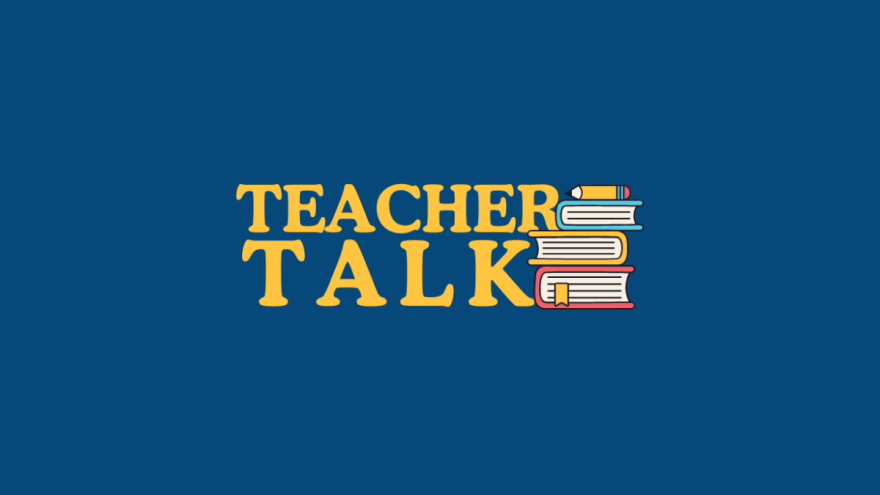For months now, I’ve been gathering around the microphone with Gina Benz and Jackie Wilber, the creative minds behind “In the Moment’s” Teacher Talk segment. We typically record our conversations on Mondays, when both teachers have wrapped their classroom work long enough to spend time in conversation and reflection. I look forward to Mondays (yes, Mondays!) and the opportunity to connect with two guests who have quickly become my friends.
Jackie and Gina are exemplary educators — which lately has me thinking about the teachers who supported and guided me from elementary school through college. I feel not only grateful, but extraordinarily lucky to have learned from so many fantastic teachers, particularly in the Sioux Falls School District.
Yet some days I can’t shake memories of the handful of teachers who fell short: the aggressive-red-pen-wielders, the teachers with their backs forever to the classroom, and the ones who reduced me to the younger sister archetype, forever in the shadow of a most beloved student who sailed through their classrooms three years before.
I know I’m not alone. As a teaching artist and workshop leader, I’ve met dozens of would-be writers stymied by recollections of that-one-teacher they say stifled their creativity or artistic dreams. I’ve met adults so ashamed of their poor spelling they hesitate to put any personal writing on paper. From high-functioning professionals with undiagnosed learning disabilities to singers terrified of lifting their voices, sometimes the oversight or the harsh critique of a teacher can have lasting impacts in ways we haven’t fully processed.
For a long time I harbored resentment toward any teacher who greeted me by asking about my older brother. Wes was smart and funny and responsible. He was uniquely tuned to the educators in his life, caring about them as people and keeping up with their favorite books or television shows. He was a thoughtful reader and astute academic. Teachers adored him. A few of those teachers felt such a strong connection to him as a student, I couldn’t help but feel I was constantly disappointing them, simply by not being my brother.
Slowly, I learned to embrace the fact that I was a different sort of student, and an occasionally challenging one at that. I asked a lot of questions, for example. I delighted in deconstructing the boundaries of the syllabus and morphing it into my own vision; more than one teacher pointed out I had strayed from the intent of an assignment. I was unapologetically late for class (for me, the bell was more of a guideline than a rule), and I was fond of daydreaming.
Realizing how my brother and I were different helped deepen my appreciation for the teachers who encouraged my inquiry and creativity while guiding me towards the fields of journalism (might as well make a career out of all those questions, kid!) and literary arts like poetry and fiction.
Now that I’m an adult, I also try to not give any teacher from my past outsized power in my life today. That has required a bit of forgiveness work for my third-grade teacher whom I rarely saw stand up from her desk. She maintained perfectly coiffed hair and checked it, often, in the small round glass of a cosmetic mirror. My strongest memory of her is on the playground, where she carefully donned a clear plastic bonnet, even on sunny days. I used to think she was more devoted to her hair than to her students.
But when I challenge myself to think back on her with loving-kindness, I see her as elderly and frail. Perhaps she was anxious about hair loss. Perhaps plastic bonnets were high fashion that year. Either way, she did her best, and I am better off releasing judgment and injury from so long ago.
And what about those red-pen-wielding education warriors? I’m guessing today’s teachers are less apt to soak a student’s paper with crimson splashes. But my memory of those red marks is a good reminder that, even though it hurts, the teachers I was most angry at were offering the lesson I most needed to learn.
So here’s to the grammarians. The ones who demanded clarity and original thinking. The teachers who loved the written word and recognized I did too. You took my arguments about semicolons and sentence fragments and parallel construction seriously. You showed me that language is worthy of a lifetime of study.
Here’s to the teachers of today, like Jackie Wilber and Gina Benz, who are taking the profession to new levels, inviting the brightest minds into the profession, and ensuring the teachers we remember are the ones who made our minds sharper and our lives better.


